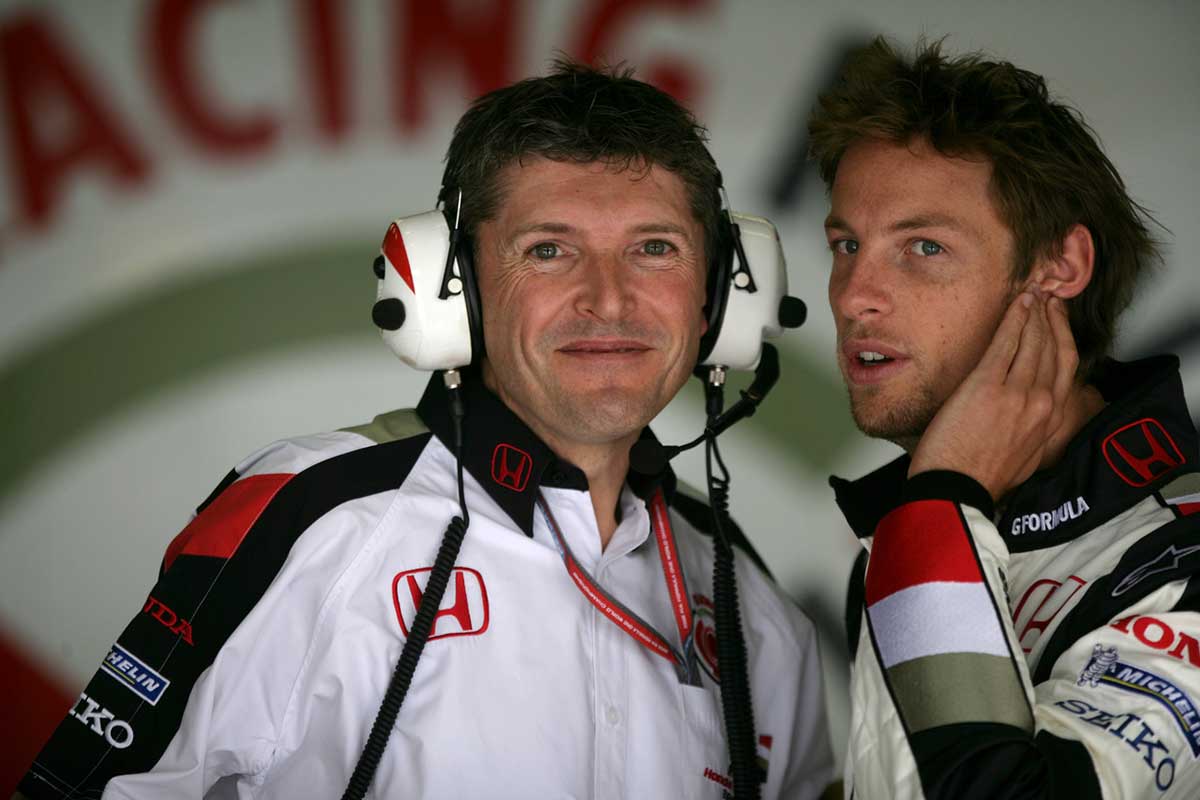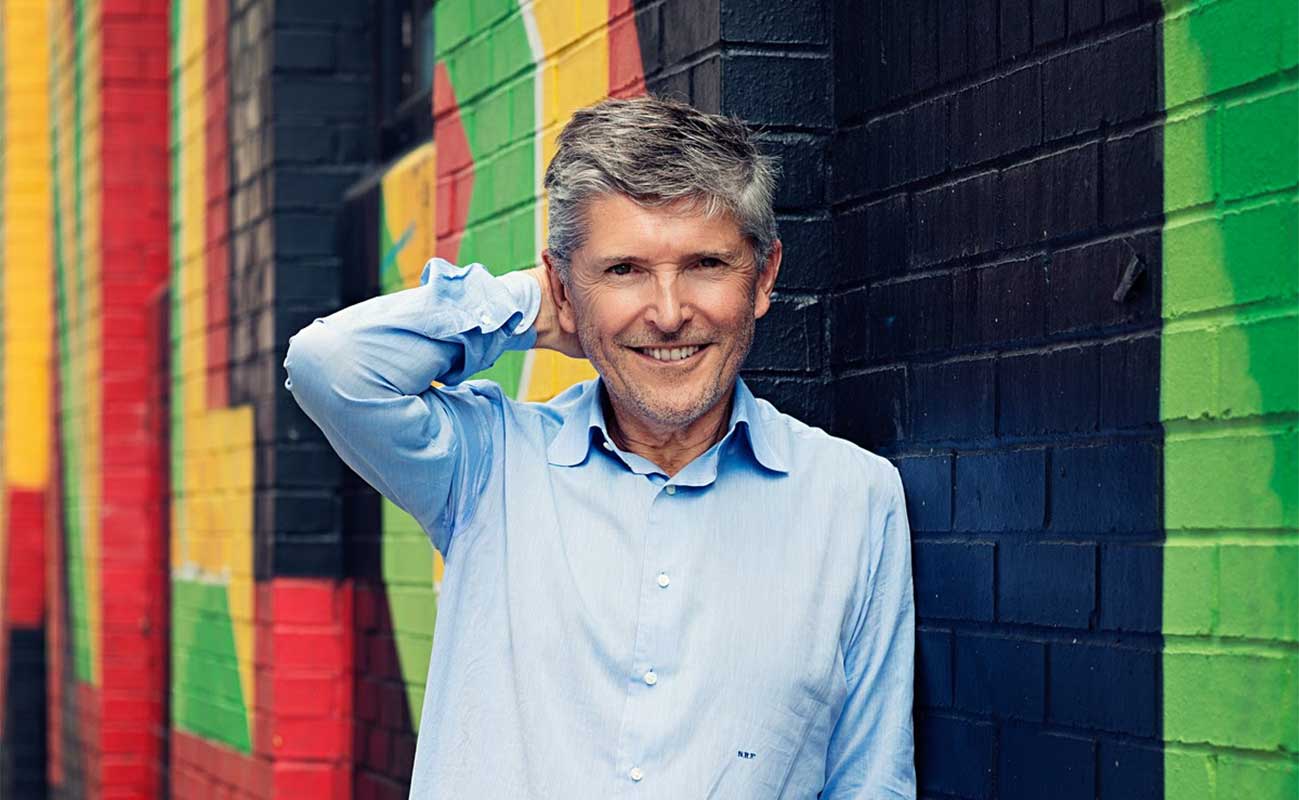This website uses cookies so that we can provide you with the best user experience possible. Cookie information is stored in your browser and performs functions such as recognising you when you return to our website and helping our team to understand which sections of the website you find most interesting and useful.
How Nick Fry took Brawn from near-bankruptcy to a fairytale finish with Jenson Button
By Lysanne Currie | 25 March 2020 | Cars & Yachts, Culture
The former Brawn CEO reveals all about his 2009 Formula 1 championship win in his new book

It’s 2006, and Honda’s Formula 1 racing team managers, CEO Nick Fry and head engineer Ross Brawn are celebrating driver Jenson Button’s win at the Hungarian Grand Prix. Fast-forward two years: a financial crisis has crippled the UK and, amid the fallout, Honda has suddenly pulled their investment from the project. Faced with total team collapse and the prospect of informing 700 employees they are about to lose their jobs, Fry and Brawn achieve something remarkable: through resilience, grit and strategic thinking, the team arise phoenix-like and soar through a fairytale turnaround culminating in Button’s extraordinary championship win in 2009.
A decade after Button was crowned world champion in that most dramatic of events (and a year before Formula 1 itself turns 70), Fry’s new book Survive. Drive. Win tells the insider account of the events leading up to it: how Brawn and Fry launched a multimillion-pound gamble called Brawn GP after Honda bailed out, and how Button had been rated an 80-1 shot to win the title before the season had even started. Sometimes, there really is such a thing as a happy ending. And Fry is paying it forward, too: all the proceeds from the book are going towards the Hope Tomorrow charity, which provides mobile cancer therapy units that can travel to rural parts of the UK.
TOP GEAR
Fry, a University of Wales Economics graduate, found his destiny right off the blocks. “I had the offer of selling soap powder or frozen food goods – or going to Ford Motor Company to pursue my dream of working in cars,” he says. It was a no-brainer. For a new graduate, there were huge benefits in working at a large corporation and Ford had the breadth to allow him to work in a number of disciplines, from financial to manufacturing, marketing, sales and purchasing.
Over the following decade or so he helped develop a range of models, including the Ford Escort Cosworth, and eventually took a role as director of service engineering in the customer service division. By the turn of the new century, Fry had joined Prodrive as managing director, soon promoted to group managing director responsible for its racing and engineering operations. The Banbury-based firm managed Honda’s Formula 1 team.
Then came the financial crash and, in 2008, catastrophe: “Our F1 team was owned in its entirety by Honda, who fell into significant problems, as did most of the industry,” he recalls. “Honda understandably felt they couldn’t continue to support a Formula 1 team that, frankly, hadn’t been overly successful. They wanted out at very short notice.” >>

TURNAROUND TALENT
“Looking back,” says Fry, what happened next “was a triumph for perseverance and optimism”. He and Brawn ended up owning Brawn GP because “frankly there was nobody else willing to take it on. I think Mrs Fry and Mrs Brawn fully expected that we were going to end up homeless or living in a caravan for the rest of our lives based on what, on the face of it, was extreme folly. But we decided to give it a go.”
Initially, they had 720 employees and a salary bill of several million pounds a month. “But the other option was to shut down the team and leave several hundred families without an income.”
One of the pair’s first tasks as team owners was to write a cheque for €8m for a season’s worth of engines – a huge risk but, “The Mercedes engine we picked was arguably the best on the grid,” recalls Fry. “On top of that we, along with two other teams, came up with a very aerodynamic device at the back of the car, the ‘double diffuser’. We had no idea it would be so powerful or that it would be accepted as legal.”
Gradually the nascent team’s hard work started to pay off. “Richard Branson cottoned on that we might have a chance and sponsored the team.” Brawn arrived in Australia in March for the first race of the season after only a couple of days’ testing, but the cars finished first and second. “We won seven of the first eight races, which put us in a very good position to win the World Championship,” says Fry with a grin.
“Looking back, it was a triumph for perseverance and optimism,” he adds. “We took on the team knowing that unless things went our way we were going to be bust, potentially within a year. If you look at 20 problems all at once it can feel insurmountable. In everyday life, this is a useful lesson. You have to look at things one at a time and knock them down one by one. If you do that you’ve got half the problems you started with. Otherwise, you could just give up.”
In the intervening years, Fry went on to become chief executive of the Mercedes F1 team, working with the likes of Lewis Hamilton and Michael Schumacher, and last year was appointed head of commercial strategy for esports company Fnatic, one of the biggest European gaming teams (“We have a team manager and a coach. They live together, they practise day after day and the top players are earning into the millions”).
“I’m one of these people who thrive on newness and new challenges,” he says. “If you’ve had a life where you’ve been on the go all the time the difficulty can be in slowing down rather than maintaining the speed.”
Now as chairman of Fnatic, he sees a big future in esports. “Traditional sports will still exist but might become the minority,” he says. “We had teams reach two League of Legends finals, the most recent of which was watched by 35 milllion people around the world online.” And with such an experienced operator at the helm, it is surely only going to thrive even further.
Survive. Drive. Win: The Inside Story of Brawn GP and Jenson Button’s Incredible F1 Championship Win by Nick Fry is published by Atlantic








